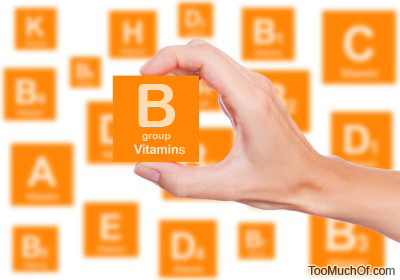
Vitamin B is a group of vitamins that are water-soluble. The most prevalent function of vitamin B group is to assist in healthy cell metabolism.
The reason for vitamin B to be divided in the group of numbers is due to the initial classification of vitamin B as a single chemical composition. Subsequent research has shown that the elements of this group are substantially chemically different while the presence of each element could be found in the same food source.
The entire group of 8 vitamins is essential for breakdown of carbohydrates into glucose, processing of fats along with proteins, support of muscle functions, gastrointestinal tract, liver function, skin health, hair, eyes health and mucous membranes of the mouth.
The vitamin B complex consists of
B1 – Thiamine – breakdown of carbohydrates into glucose
B2 – Riboflavin – processing of fats and proteins
B3 – Niacin – responsible for metabolic transfer of fat, alcohol and glucose with help of nicotinic acid and nicotinamide
B5 – Pantothenic acid – oxidation of carbohydrates and fatty acids
B6 – Pyridoxine – metabolism of lipids and amino acids, production of hemoglobin and neurotransmitters as well as nicotinic acid (a.k.a B3)
B7 – Biotin – metabolic conversion of proteins, carbohydrates and lipids
B9 – Folic acid – transfer of single carbon in the metabolic function of cholesterol, amino and nucleic acids
B12 – Cobalamin – facilitates healthy production of blood cells within bone marrow, proteins and nerve pathways while being involved in conversion of lipids, proteins and carbohydrates.
Too much vitamin B intake can become toxic
Vitamin B group is water-soluble and is considered to be a low toxicity compound due to a rapid excretion through urine. However, some toxicity can occur and cause an array of conditions that usually resolve with discontinuation of vitamin B intake. Vitamin B group is also a potential hazard to liver health since it is stored in the liver.
The modern tendencies found in many vitamin B supplements can eventually disrupt many body function mechanisms if taken on a long term. Unless an individual is low in specific vitamin B compounds and confirmed via blood tests, it is strongly suggested to intake all vitamin Bs from foods and not from supplements.
Known side effects, conditions and dangers when too much of vitamin B elements concentration present in the body
Vitamin B1 – no clinically documented thiamine side effects from oral intake, although there are reports of anaphylaxis through intravenous injections of thiamine
Vitamin B2 – partial studies on animals and humans report no evident riboflavin toxicity, although free radicals are shown to be formed in vitro studies under significant exposure of riboflavin to ultraviolet light spectrum
Vitamin B3 – when overdosed, niacin produces flushing, nausea and vomiting that are linked to liver toxicity
Vitamin B5 – low or negligible pantothenic acid toxicity observed, although excessive intake amounts have not been extensively studied and may result in diarrhea, biotin deficiency, hair thinning, low energy, cold hands and feet, racing thoughts. Resulting Biotin deficiency has symptoms of scaly skin patches especially around the nose and mouth, parasthesia/tingling, anemia, frequent pinkeye, irregular heartbeat, anorexia, and hair loss
Vitamin B6 – excessive pyridoxine intake is associated with peripheral neuropathy and skin lesions. May cause excessive urination as a diuretic and insomnia as it releases glucose stored in muscles and converts amino acids (blocks of proteins) into glucose, raising blood sugar. Causes insomnia and provokes a hyperthyroid condition in some individuals.
Vitamin B7 – no well pronounced biotin toxicity is known
Vitamin B9 – folic acid may mask existing B12 deficiency, thus leading to permanent neurological damage. Symptoms of vitamin B12 deficiency are rapid heartbeat and breathing, fatigue, weakness, pale skin, sore tongue, easy bruising and bleeding of the gums, constipation or diarrhea. Vitamin B12 deficiency can also result in nerve cell damage that presents with symptoms of tingling or numbness in fingers and toes, difficulty walking, depression, memory problems and dementia
Vitamin B12 – cobalamin may cause generalized skin rash, low potassium levels (hypokalemia), mild diarrhea and perceived swelling of the body, dizziness, headache, nasal congestion, tingling of the hands and feet, heart palpitations. Excessive supplementation increases cell division and may aggravate cancer cell replication
Resolving toxicity associated with vitamin B group of vitamins
The approach to detoxify from vitamin B overdose is to immediately stop any vitamin B supplementation. It is strongly recommended that the best way to get appropriate amounts of B group of vitamins is through the foods and not supplements. Additional vitamin B supplementation should only be considered if there is a specific condition that warrants additional intake or as directed by a doctor.
